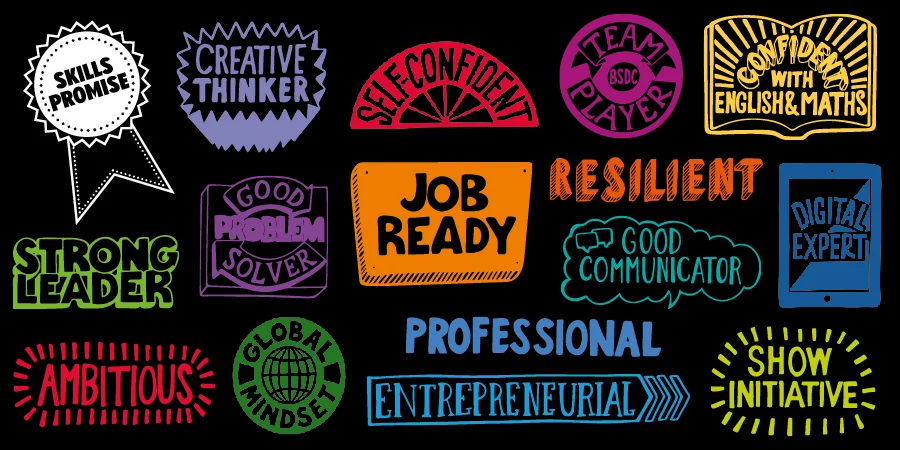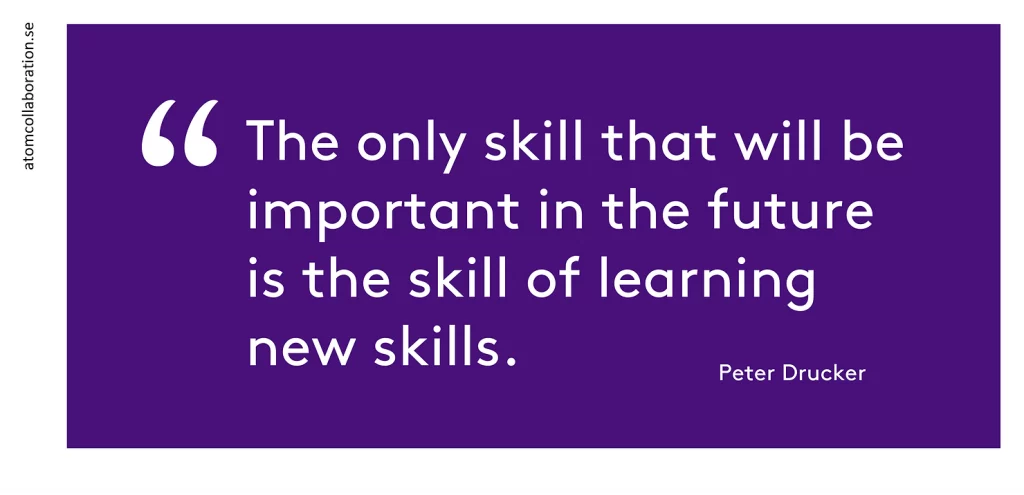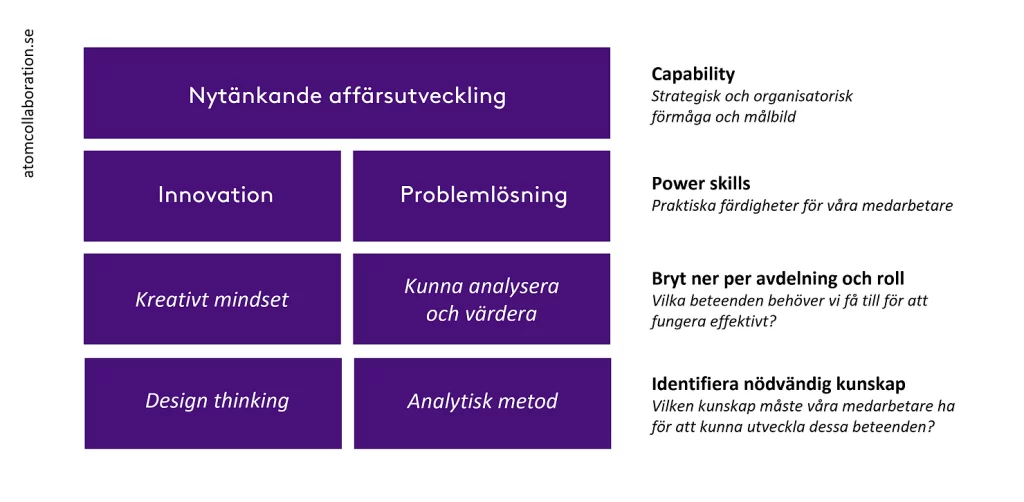Having the right skills, the right attitude and the right conditions is one of the main competitive advantages of business. We also know that upskilling and reskilling employees is a crucial investment for success as we need to keep up with the world’s rapid pace of change around digitalization, automation and new sustainable solutions. It also helps to both attract new talent and retain employees.

If you as a leader want to take your organization’s or team’s skills development efforts to the next level, investing in an upskilling strategy can be a worthwhile investment. In an interesting report “Workplace Learning & Development Trends 2022” by SHRM, 8 out of 10 HR managers say that their company’s upskilling offer helps to attract (83%) and retain employees (86%). On average, 76% of employees have responded that they are more likely to stay longer in a workplace if it offers continuous upskilling. The same survey shows that 8 out of 10 employees (84%) say it is important to develop power skills and 76% of HR managers say they are likely to focus on offering power skills in the next 12 months.
Power skills – what is it again?
Before we talk more concretely about the Power skills that are most relevant to invest in, it may be good to have a brief repetition of the concepts; Capabilities are more strategic overall abilities. Hard skills are technical skills and soft skills are softer, composite behaviors, many of which are now called power skills because they are valuable skills that respond to the rapid changes in the world. Hard skills have historically dominated the labor market and are easier to list on a CV, but they are often replaced by technology today and in the future. Just because you’re a good programmer doesn’t mean you’re good at meeting deadlines, collaborating and communicating with others, or helping to solve bigger problems. However, it has been shown that companies that have employees with a broad mix of skills generate higher levels of innovation and productivity. For employees, it has in many cases led to improved health and higher income.

A few years ago, I was working with a client on an AI training for HR. After many rounds of one of the subject matter experts’ educational presentations, we concluded that the main message must ultimately be that we need to evolve at a dynamic pace with the development of AI. Of course, we already know some of the skills and behaviors required for AI interventions today, but it is difficult to predict what skills we will need tomorrow. The same mindset really applies to all development in relation to the rapidly changing world, what and how we need to learn. It is also the answer to which Power skill is the most essential one we should develop first – Learnability. Because if we all take responsibility and have skills and habits where we constantly develop ourselves in areas we both want and need to do our jobs, we can also evolve with the changing world in virtually anything. Here, we companies and organizations can take responsibility for guiding employees in general future skills, the skills needed in the company and in different roles and offer a smorgasbord of different skills.
But we conclude that Learnability, i.e. the ability to learn continuously and take responsibility for one’s own development, is the most fundamental Power Skill that companies should focus on first and foremost.
But what other power skills should companies invest in to be prepared for the challenges of the future?
Ten of the sixteen key future skills identified by the World Economic Forum are power skills (although the report calls them soft skills). To further reinforce the importance of power skills, a Deloitte report predicts that power skills will account for 2/3 of all jobs by 2030 and the number of jobs in power skills-intensive occupations is expected to grow by 2.5 times more than other occupations. It is as big a transformation and trend as, for example, the shift from ‘workers’ to ‘officials’.
After a fairly quick analysis of the reports and articles published by the major consulting and trend analysis companies, most future power skills are about developing successful behaviors such as Creative Thinking, Collaboration and Emotional Intelligence. If employees are asked to choose, Leadership self-leadership, wellbeing and problem solving are high on the list (in the same SHRM report mentioned above, 54% say that leadership is the most desired skill).
While each analyst firm has different headings and sub-headings, there are some recurring patterns in several reports that can be boiled down to five areas.
5 important power skills to invest in as a company:
1. Learnability / Adaptation (adapting to the changing environment and continuous learning)
2. leadership and self-leadership linked to behaviors that deliver efficiency and productivity.
3. critical thinking, analytical thinking and problem solving
4. emotional and social intelligence and cognitive intelligence based on empathy leading to better communication and cooperation.
5. creative and innovative thinking

None of us can be good at everything, or for that matter develop everything all the time. We cannot impose this requirement on our staff either. But the point is that whether it’s about what we should offer our employees as a company around upskilling or keeping up with the changes in the world as employees, we can conclude that Power skills are time well spent – those kinds of skills never go out of date no matter what the future holds. You could say that hard skills vary depending on the job or role, but power skills are required for every job. Whether an employee’s role is specialized and technical in nature or not, they will always benefit from demonstrating adaptability and communication skills, among others. However, if we choose to develop a skills strategy where Power skills are our umbrella skills that can work broadly throughout the organization and benefit all employees and mobility, we must at the same time take into account that the development of Power skills does not happen overnight. It takes years of training and experience to be able to say you own a Power skill. As Josh Bersin of Deloitte puts it:
“ Hard Skills are soft (they change all the time, are constantly being obsoleted, and are relatively easy to learn), and Soft Skills / Power skills are hard (they are difficult to build, critical, and take extreme effort to obtain).
But if we start now and choose the right path where we offer future skills development to our employees, we give them and the organization a chance to sharpen them over time. It will also make us more ready for the challenges of the future, no matter what’s around the corner.
Sources
https://betterhumans.pub/top-10-power-skills-you-should-learn-this-year-e9be3ae5bde1
https://blog.udemy.com/top-power-soft-skills-work-2022/
https://www2.deloitte.com/au/en/pages/economics/articles/soft-skills-business-success.html
The Top 10 Most In-Demand Skills For The Next 10 Years (forbes.com)
https://www.edvantic.com/blog/learnability-the-most-important-skill-of-the-future




